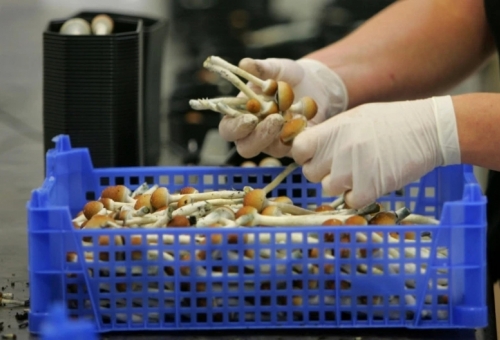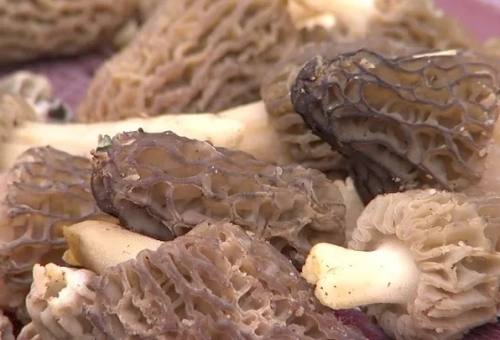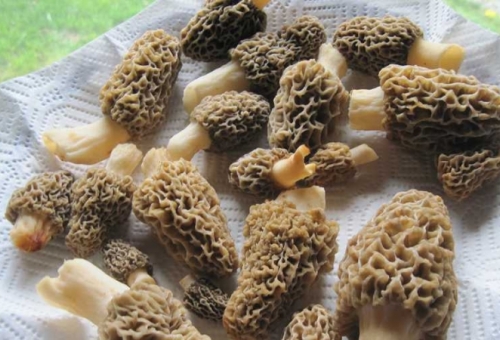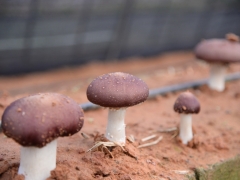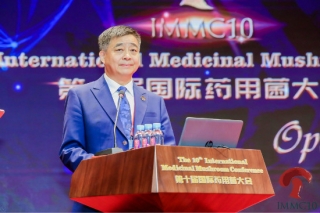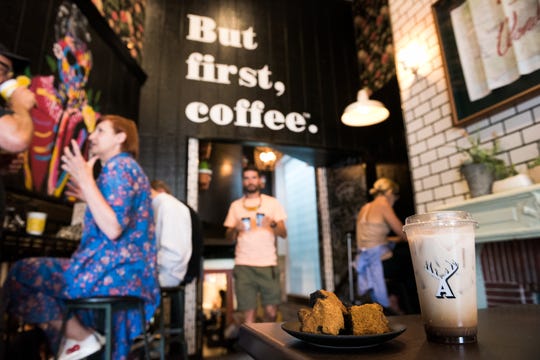
The Shroom Room looks exactly the way something called the Shroom Room ought to. The tiny space, which is used as a showroom for mushroom powder purveyor Four Sigmatic, looks like a house for a hobbit particularly fond of fungi. There are red (toadstool) stools at the entrance, miniature mushrooms where the walls meet the mossy ground, rows of powdered 'shroom elixirs, and a white wooden awning topped with the kind of plants you’d expect to see in an unkempt yard. When general manager Aaron Kaskowitz is on duty, the Shroom Room softly pulses with a mix of world music and cosmic beats.
If you’re going to drink mushroom coffee anywhere, this is the zen spot to do it. But that begs the question: Why drink mushrooms at all?
Four Sigmatic's Shroom Room is tucked behind a boutique eco-friendly homegoods store on Venice's trendy Abbot Kinney Bouleverd. Cutest mushroom cafe we've ever seen? Obviously.
Four Sigmatic's Shroom Room is tucked behind a boutique eco-friendly homegoods store on Venice's trendy Abbot Kinney Bouleverd. Cutest mushroom cafe we've ever seen? Obviously. (Photo: Sandy Hooper)
Mushroom coffee is trending
Call it “mindfulness” or “self care,” talking about hip health food is a popular topic today on social media, food blogs and health podcasts. Accordingly, wellness trends like oat milk and CBD have hit the mainstream, and drinks with powdered mushroom mixed in are on the rise.
According to a Pinterest study released at the start of 2019, superfood powders have had a 144% year-over-year spike in searches on the 250-million-user-strong social media site, and interest in nutrient-packed mushrooms, in particular, is up 46%.
The global mushroom market will exceed $50 billion by 2022, in part because of the food's association with healthy eating, predicts market research company Grand View Research.
Medicinal mushrooms are among the emerging foods that 1 in 4 adults want to try to manage their wellness, a new NPD Group study found.
Shroom Room’s Four Sigmatic, the Goop-approved company that deserves the most credit for bringing medicinal mushrooms into the American consciousness, now holds the No. 1 spot on Amazon’s “instant coffee best sellers” list with its box of 10 mushroom coffee packets for $15.
Medicinal mushrooms (which do not get you high and are not psychedelic) can be found in vitamin stores with brands like Sun Potion (that sells 100-gram jars for about $50); at grocery stores like Whole Foods (another place where Four Sigmatic is sold); and via fancy drinks at hip cafes, like in the popular chaga-ccino (that costs $7.50) at Alfred Coffee in California and Texas.
“Suddenly (putting mushrooms in drinks is) becoming really trendy, although it's really ancient for wellness,” says Kaskowitz, who pours us lion’s mane and chaga mushroom coffees beneath a shelf filled with elephant ear-shaped ’shrooms. Cozy.
Alfred Coffee in Los Angeles has plenty of regulars who come in for their daily dose of mushrooms in a Chaga-ccino.
Are there legit health benefits?
Medicinal mushrooms, also referred to as (the somewhat arbitrary term) superfoods and (the word for alternative medicines that promote homeostasis) adaptogens, have long been used in Chinese medicines before trendy Americans caught on.
I press Kaskowitz for reasons why the drink is good for you, but he's quick to point out that his rationale for sipping mushrooms has more to do with his own experience than with verified studies. Kaskowitz, a former health coach and current student of herbology who is battling multiple sclerosis, tells me he's found certain mushrooms make his body feel “less stressed, less overwhelmed (and) more smooth.”
He does seem smooth today as he graciously pours out mushroom powder and offers toadstool keychains inside of the vibiest miniature cafe I've ever entered. (There are free samples and Four Sigmatic swag.) He continues his role as a calming presence in my life.
“Part of my purpose as an individual is to help people live their most happy lives," he says. I buy into it 100%.
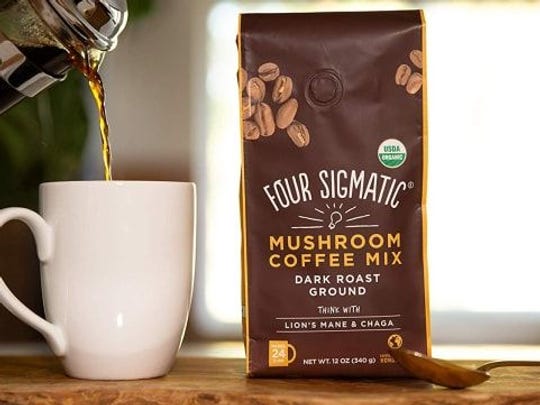
Four Sigmatic's mushroom coffee mix is the best-selling instant coffee sold on Amazon.
And, later, I think I'm experiencing the benefits of the chaga (touted as an immune system booster) and lion's mane (a supposed ally for your nervous system). I feel a lightness that’s similar to a caffeine buzz, but without the crash. And then I realize this jolt-less experience may be totally in my head, because I can't tell what's real after I've begun implicitly trusting my new wellness sensei.
Dietitian Carrie Gabriel, who also writes for herbal supplement company Hum, offers a second opinion.
Mushroom coffee "definitely has values as an antioxidant and helping with digestion and giving you some focus without jitters,” she says. Validation?
However, she adds, “I’ve had a tough time wanting to shout on the cliffs that adaptogens (like mushrooms) are great,” because aside from some studies on chaga’s anti-cancer properties, there still isn’t much evidence-backed research on the stuff.
Gabriel says she won’t explicitly prescribe medicinal mushrooms to clients, but she might suggest that someone who gets anxious from a lot of caffeine try the lower-caffeine version of mushroom coffee. Still, “I can’t honestly tell you that I have felt anything special from (the mushrooms).”
Chaga mushrooms, left, are turned into powder and used as an ingredient in Alfred Coffee's Chaga-ccino, right.
What does mushroom coffee taste like?
The wellness fungi — with names including chaga, reishi, cordyceps and lion’s mane — aren’t the mushroomy portobellos your tongue's anticipating. They’re more like soil-flavored blandness. “Earthy,” if you’re being kind. Which means they easily hide in flavorful coffees and teas, and even work to cut black coffee's acidity.
That being said, the chaga and lion’s mane coffee is actually decent.
“(Customers) always use the word ‘actually’ when they say ‘this is good,’ to qualify it,” says Kaskowitz. “Their expectations are that it’s going to ... taste like medicine.”
I try another one of Four Stigmatic’s many powdered offerings: A mushroom cacao mix with reishi (meant to be a stress-reducer) that I pour into my coffee and proceed to offer my coworkers. They don't accept my drinks, because I'm not good at being an elixir evangelist like Kaskowitz is. They think I'm trying to drug them.
No, I explain to them. They're not magic mushrooms, per se. I did get them from a tiny hobbit house, though.





